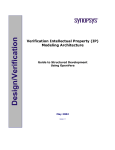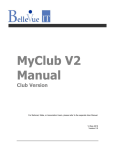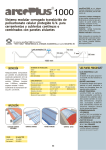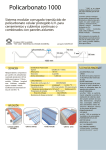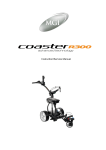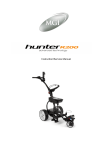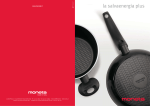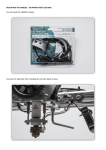Download Improving and Troubleshooting Extrusion
Transcript
PROGRAM OUTLINE Monday 12 September 2011 8.00 am Registration 8.30 am Welcome and start Day 1: Improving extrusion Introduction to extrusion »» Nomenclature »» Basics of extrusion in a nutshell –– What is plastic extrusion? –– What are plastics? –– What happens inside the extruder »» New developments in extrusion –– Ultra high speed extrusion –– High efficiency degassing extruders »» Instrumentation and interpretation of process data –– The vital signs of the extruder –– How the measure pressure and temperature Improving the extrusion process: »» How to assess the efficiency of an existing extrusion operation –– Yield –– Scrap rate –– Process capability »» Efficient machine design –– Screw design –– Die design –– Hopper and feed housing design –– Heating and cooling the extruder »» Efficient machine operation –– Methods of feeding –– Why cooling should be minimized –– Close-loop control –– Total line control »» Efficient machine setup –– Preventative maintenance –– Instrumentation and process monitoring –– Data acquisition capability –– Statistical process control »» Product changeover and purging –– Machine design for quick changeover –– Running resins with different viscosities –– Running resins with different colours –– Purging techniques –– Purging compounds »» Reducing material cost –– Low cost filler –– Recycled plastic –– Foamed plastic –– Polymer processing aids »» Reducing energy consumption –– How to determine the energy efficiency of the extruder –– Preheating the dryer –– Discharge melt temperature –– Thermal insulation of machine parts 11946_RMPC Seminar_DL.indd 1 »» Efficient troubleshooting –– Requirements for efficient troubleshooting –– Troubleshooting tools –– Typical extrusion problems »» Optimizing extruder barrel temperatures –– Design of experiments –– One-at-a-time experiments –– Dynamic optimization »» Flexible manufacturing methods, examples –– Quick-change extrusion systems –– Adjustable calibrators –– Continuous die gap adjustment –– Internal pipe cooling 5.30 – 730 Monday evening Drinks, hors d’oeuvres and discussion Tuesday 13 September 2011 8.00 am Registration 8.30 am Welcome and start Day 2: Troubleshooting Troubleshooting the extrusion process: »» Requirements for efficient troubleshooting –– Instrumentation –– Understanding the process –– Collection of historical data –– Condition of the equipment –– Information on the feedstock »» Tools for troubleshooting –– Temperature measurement devices –– Data acquisition systems –– Microscopy –– Thermochromic materials –– Thermal analysis »» Systematic troubleshooting –– Upsets versus development problems –– Troubleshooting techniques –– Machine related problems »» Polymer degradation –– Thermal degradation –– Mechanical degradation –– Chemical degradation –– Solving degradation problems »» Extrusion instabilities –– Frequency instability –– Mechanism of instabilities –– Functional instabilities –– Solving extrusion instabilities –– Information on the feedstock »» Other extrusion problems –– Air entrapment –– Gel problems –– Die flow problems –– Wear problems Registration Form—Industrial Extrusion: Improving and Troubleshooting Extrusion 12 and 13 September 2011 (Please photocopy for additional registrations) Name:______________________________________________________ Position:____________________________________________________ Company name:_____________________________________________ Mailing address:______________________________________________ ___________________________________________________________ Tel._________________________________________________________ Email:______________________________________________________ Fees Both days—AUD$1,200 + GST Single day—AUD$650 + GST For single day registration please indicate: � Monday only � Tuesday only This includes registration, lecture notes, arrival tea/coffee, morning tea, afternoon tea and lunch,drinks and hors d’oeuvres at Monday evening discussion session. Discount (Only one discount per registration) � I am an SPE member—AUD$50 per day discount OR � Company registrations of two (2) or more people— AUD$50 per person per day discount Method of payment � Cheque (payable to Rheology and Materials Processing Centre) Mail cheques and registration form to: Rheology and Materials Processing Centre RMIT University GPO Box 2476 Melbourne VIC 3001 � Credit card (Visa or Mastercard)—Tel. +61 3 9925 3653 Receipt number: _____________________________________________ � Please email a copy of my receipt Prepaid Credit Card Registration Please fax the completed form including your receipt number to fax: +61 3 9925 2268 All fees are to be paid in advance—Payment must be in Australian dollars. 21/07/11 12:06 PM Who should attend? Principal Lecturer »» Operating personnel such as extruder operators, technicians, setup people, supervisors, etc. »» People involved in extruder maintenance and repair »» Process engineers and manufacturing engineers involved in extrusion. »» People responsible for buying new extrusion equipment and upgrading existing extrusion equipment »» People responsible for extrusion operations such as manufacturing managers, plant managers, operation managers etc. »» Engineers responsible for the design of extrusion equipment or components »» Technical service personnel from resin producers and extruder manufacturers. »» Students and recent graduates who want to learn practical information on extrusion. Chris Rauwendaal, President of Rauwendaal Extrusion Engineering, Inc has 33 years experience in the plastic extrusion industry. He worked for four years in the man-made fiber industry for American Enka Corp. (now BASF Fibers), and twelve years for Raychem Corporation, a producer of specialty plastic products, as manager of Process Development. General information Registration The number of participants is limited and it is therefore recommended that you register as early as possible. An administrative fee of AUD$50 will be charged for cancellations received one week before the course starts. After this date there will be no refunding of registration fees but full credit can be given for another person from the same company to attend. Substitutions may be made at any time but an advance notice would be appreciated. RMIT Rheology and Materials Processing Centre will not be responsible for any costs incurred by the attendee in the unlikely event of the seminar being cancelled. Accommodation A special rate has been negotiated with the Rydges Carlton Hotel: AUD$189.00 per Queen room per night. A full buffet breakfast is available for an additional $22.00 per person. Please make your own reservations. Availability is on a first-come-first-serve basis. Bookings must be made directly by calling reservations on 1800 333 001 toll-free from outside Melbourne metropolitan area or (03) 9347 7811. To obtain the above-negotiated rates please indicate your participation in the RMIT Extrusion seminar and quote the special rate. Chris has experience in a wide range of extrusion operations, including fiber spinning, film, sheet, tubing, and profile extrusion, coextrusion, and reactive extrusion. Chris has worked on both practical and theoretical problems such as screw and die design, troubleshooting, modelling and computer simulation, material analysis and failure analysis. He has received several awards and is a Fellow of the SPE. Chris has several patents to his name and has written more than 200 articles on extrusion, seven books, two video training seminars, and two interactive CD-ROM courses ITX and SPCIM. Rheology and Materials Processing Centre industrial extrusion Improving and Troubleshooting Extrusion Enquiries Mike Allan Tel. +61 3 9925 2088 Fax: +61 3 9925 2268 Email: [email protected] Sponsored by RMIT University, Rheology and Materials Processing Centre and the Society of Plastics Engineers 12 and 13 September 2011 Rydges Carlton Hotel 701 Swanston Street Carlton, Melbourne Australia Melways Ref: 43 G5 Principal Lecturer Chris Rauwendaal Rauwendaal Extrusion Engineering, USA Disclaimer Every effort has been made to ensure the information contained in this publication is accurate and current at the date of printing. For the most up-to-date information, please refer to the RMIT University web site. RMIT University Provider Code: 00122A. 11946 0711 11946_RMPC Seminar_DL.indd 2 21/07/11 12:06 PM



